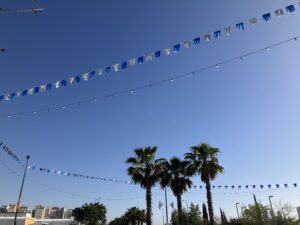King Solomon is famous for his reign of peace and prosperity. However, despite a good start, he did not share his father’s passion for God as time went on. Paying careful attention to the biblical narrative, we can spot a few clues about where Israel was headed and why… and what it might mean for us as believers today.
“Judah and Israel were as numerous as the sand by the sea in abundance, eating and drinking and rejoicing. Now Solomon ruled over all the kingdoms from the River to the land of the Philistines up to the border of Egypt. They brought tribute and served Solomon all the days of his life.” (1 Kings 4:20-21)
What does this first sentence remind you of: “Judah and Israel were as numerous as the sand by the sea in abundance”? It reminds me of God’s promise, His covenant, with Abraham:
“I will surely bless you, and I will surely multiply your offspring as the stars of heaven and as the sand that is on the seashore. And your offspring shall possess the gate of his enemies, and in your offspring shall all the nations of the earth be blessed, because you have obeyed my voice.” (Genesis 22:17-18)
But there is a twist.
God always fulfills His word
God made His covenant with Abraham, Isaac and Jacob involving a descendants, a land, and the promise of blessing for all nations. (His promises to Abraham can be found in Genesis 12:1-3, then in chapters 15 and 17, to Isaac in 26:3-5, and to Jacob in 28:12-15). Solomon noted that after several long centuries God’s promises had come to pass:
“Blessed be the Lord who has given rest to his people Israel, according to all that he promised. Not one word has failed of all his good promise, which he spoke by Moses his servant.” (1 Kings 8:56)
So much had happened! The childless octogenarian really did bear offspring—when he was almost 100 years old! The twelve tribes of Israel really did go into slavery for 400 years in Egypt, and were dramatically delivered and brought back with great riches to the Land of Promise (exactly as foretold in Genesis 15:13-16). Then they really did possess the gates of their enemies and now here they all are, from Dan to Beersheva, settled in the Land of Israel. Just as God had said. And here sits Solomon in his palace in Jerusalem, in all his splendor, with a magnificent temple to the God of Israel. No wonder the abundantly numerous people of Israel were eating, drinking and rejoicing. It really happened!
However, even in the very chapter where Solomon’s Israel are basking in the glory, we see telltale cracks. There are hints at a divided kingdom (Judah and Israel were as numerous as the sand by the sea in abundance) and there is talk of gathering tens of thousands of horses in verse 26–something specifically prohibited for Israelite kings in Deuteronomy 17:16. Trouble loomed. This golden era would not last long. Yes, there was peace and prosperity, yes the kingdom was extensive and life was good, yes the Israelites were abundant as the grains of sand… but still one aspect of God’s promise was outstanding and no one seemed to notice.
The promises were fulfilled! But they were keeping all God’s blessing for themselves. They had forgotten about blessing the nations.
Solomon later mentions the importance of nations recognizing the God of Israel but assumes it will happen when they see how jolly blessed Israel is:
Let these words of mine, with which I have pleaded before the Lord, be near to the Lord our God day and night, and may he maintain the cause of his servant and the cause of his people Israel, as each day requires, that all the peoples of the earth may know that the Lord is God; there is no other. (1 Kings 8:59-60)
However, these promises given to Abraham were never supposed to be just for the people of Israel; they were for whole world. God would use Israel as His chosen vessel to deliver The Seed, the Messiah, who would redeem and deliver the world from sin. Solomon and co. made the mistake, a mistake we are all prone to make, of thinking that God’s miracles and promises are all about us.
Sand and stars
When God spoke to Abraham in Genesis 22 He promised not only sand but stars.
God said that Abraham’s descendants would be “as the stars of heaven and as the sand that is on the seashore”. The narrator of Solomon’s reign only mentioned one of them: sand. These two metaphors are very interesting to consider. The Hebrew word for sand (חול, “chol”) also means something like “ordinary”. It is used in contrast to “holy”. Shabbat and the feasts are holy days, “kadosh”, but the other days are regular “chol”. It’s not something evil or terrible, but just not set apart or special. Like sand. If we want to talk about someone being secular, this is the root word used, and it is interesting that the extremely secular city of Tel Aviv was built on sand dunes! We can think of sand as carnal as opposed to spiritual.
Stars on the other hand often represent God’s holy people. The twelve tribes of God’s holy people are represented as stars in Joseph’s dream (Genesis 37:9). The prophet Daniel gives a remarkable hint about the different destinies of the saved and unsaved, the wise and the foolish, using a picture of stars:
And many of those who sleep in the dust of the earth shall awake, some to everlasting life, and some to shame and everlasting contempt. And those who are wise shall shine like the brightness of the sky above; and those who turn many to righteousness, like the stars forever and ever. (Daniel 12:2-3)
Similarly, in the New Testament, Paul uses this same star metaphor from the Hebrew Scriptures:
Do all things without grumbling or disputing, that you may be blameless and innocent, children of God without blemish in the midst of a crooked and twisted generation, among whom you shine as lights in the world, holding fast to the word of life, so that in the day of Christ I may be proud that I did not run in vain or labor in vain. (Philippians 2:14-16)
Wisdom from Solomon’s example
Sand is concerned with the realm here on earth. Sand represents the worldly ones who think on the micro scale, and who struggle to perceive God’s overarching plans for the nations but are focussed on their own gratification and gain..
Stars, however, think beyond themselves and pour out their own lives for the sake of others. They shine and illuminate the way in the darkness, no matter how dark it gets.
Solomon’s kingdom was in some ways built on sand. It would not last long. Sure, they arrived in the Land and prospered for a while, but it was a house divided and it did not stand. Yeshua the Messiah on the other hand, the Seed of Promise, came to the earth and poured out His life as a sacrifice for many, to show the way back to the Father. He showed the way to eternal life. God’s ways are far bigger and better than ours. The rejoicing in the time of Solomon knows nothing of the rejoicing there will be in the house of our Heavenly Father!
God is faithful to keep His promises, and will not let His word fall to the ground—even if we are unfaithful. But when God blesses you, when He fulfills a promise to you, don’t keep it to yourself! Give it back to God to see what powerful things He will do to reach far more lives than you could ever imagine.
















